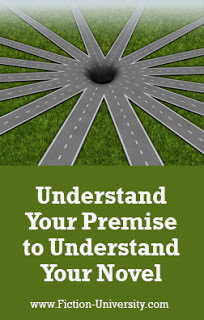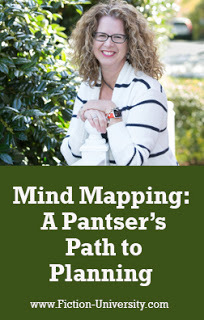Janice Hardy's Blog, page 71
July 7, 2019
Writing Prompt: The Chain Story: That's Not Right.
 By Janice Hardy, @Janice_Hardy
By Janice Hardy, @Janice_HardyLast month I took a survey to see which Sunday post you guys preferred--tips or prompts. Most asked for tips, but enough of you also liked the prompts I decided that the first Sunday of every month would be for prompts.
This month’s prompt is a chain story! I’ll give you the first line, and someone else comments and builds off that line. Next commenter will build off that line, and so on.
In the event of two commenters posting at the same time and sending the story in different directions, just pick the line you like best, or try to incorporate both if you can.
There was definitely something wrong with him.
Let the fun begin. Written by Janice Hardy. Fiction-University.com
Published on July 07, 2019 04:30
July 6, 2019
Real Life Diagnostics: Does the Dialogue in This Scene Work?
 Critique By Janice Hardy, @Janice_Hardy
Critique By Janice Hardy, @Janice_HardyReal Life Diagnostics is a weekly column that studies a snippet of a work in progress for specific issues. Readers are encouraged to send in work with questions, and we diagnose it on the site. It’s part critique, part example, and designed to help the submitter as well as anyone else having a similar problem.
If you're interested in submitting to Real Life Diagnostics, please check out these guidelines.
Submissions currently in the queue: Three
Please Note: As of today, RLD slots are booked through July 27.
This week’s question:
Does this scene with dialogue work?
Market/Genre: Contemporary Romance
On to the diagnosis…
Continue ReadingWritten by Janice Hardy. Fiction-University.com
Published on July 06, 2019 06:42
July 5, 2019
On the Road: How to Write an Opening Scene that Hooks Readers
 By Janice Hardy, @Janice_Hardy
By Janice Hardy, @Janice_HardyI'm over at Writers in the Storm today, talking about How to Write an Opening Scene that Hooks Readers . Come on over and say hello!
And for those in the South Florida area (or those within driving distance to it), a reminder about my workshop next weekend in Delray Beach, FL. Seats are still available.
The Authors Academy Writers Workshops
Saturday, July 13, 10:00am to Noon
Murder on the Beach Mystery Bookstore
At their new location: 104 West Atlantic Avenue, Delray Beach
All workshops are $25 per person. Reservations are requested.
The Muddle in the Middle
The “boggy middle” has claimed many a writer, but with a little planning and forethought, writers can sail right through it. In this workshop, you'll discover why the middle is such a troublesome chunk of the novel, and how it’s really where all the fun happens in a story. You’ll also learn how to avoid getting sucked into the mire, what to do keep your pace moving, and some nifty plotting tricks to help you create stronger story arcs and conflicts.
The Florida Authors Academy Writers Workshop series runs all summer long, with workshops every Saturday. Get the full lineup of workshops here.Written by Janice Hardy. Fiction-University.com
Published on July 05, 2019 04:39
July 4, 2019
Put a Stop to Procrastination – Today!
 By Shanna Swendson, @ShannaSwendson
By Shanna Swendson, @ShannaSwendsonPart of The Writer’s Life Series
JH: Some days, we want to do anything but write. Shanna Swendson returns this month with tips on getting back to work when you don't feel like writing.
Shanna Swendson earned a journalism degree from the University of Texas but decided it was more fun to make up the people she wrote about and became a novelist. She’s written a number of fantasy novels for teens and adults, including the Enchanted, Inc. series and the Rebel Mechanics series. She devotes her spare time to reading, knitting, and music.
Website | Twitter | Facebook | Goodreads
Take it away Shanna…
Continue ReadingWritten by Janice Hardy. Fiction-University.com
Published on July 04, 2019 03:00
July 3, 2019
Give Your Self-Published Book Its Best Shot
 By Laurisa Reyes, @lwreyes
By Laurisa Reyes, @lwreyesPart of the Indie Authors Series
JH: Laurisa Reyes is back this month on the other side of the publishing desk, sharing tips on how to give your self-published books its best chance.
Publishing today is easier than ever. Once a book is written, it is pretty simple to format and upload it to KDP and present it to the world, but the ease of the process can be deceptive. Just like it is easy to publish your own book, it is even easier to fail. What I mean by fail is this…
You’ve spent months, maybe years, writing your book. You’ve poured your heart and soul into it. You want people to read it. You want people to buy it. But here is where too many authors sell themselves, and their books, short. The fact is they often don’t want to spend the time or the money to “do it right.” The result is a poorly crafted book that fails to attract readers.
Continue ReadingWritten by Janice Hardy. Fiction-University.com
Published on July 03, 2019 05:02
July 2, 2019
Are You Looking for a Critique Group or Partner?
 By Janice Hardy, @Janice_Hardy
By Janice Hardy, @Janice_Hardy It's Crit Time Again! The 2019 Summer Group is now open!
Back in 2013 I started a Yahoo Group called "Janice Hardy's Critique Connection" to help writers connect with like-minded folks looking for critique groups or partners. It was designed to help people find long-term, quality writing partners, not just places you can toss up your work and get quick feedback.
It went from a one-time event to annually, and now to every six months (I open it up every January and July). If you're looking to join or create a critique group, add more to your existing group, or find a critique partner, odds are you'll find someone here.
Continue ReadingWritten by Janice Hardy. Fiction-University.com
Published on July 02, 2019 03:30
July 1, 2019
Understand Your Premise to Understand Your Novel
 By Janice Hardy, @Janice_Hardy
By Janice Hardy, @Janice_Hardy A great premise is a great start, but there’s more to writing a compelling novel than having a cool idea.
There’s a strange phenomenon in Hollywood where two movies with the same premise appear at the same time. Volcano and Dante’s Peak. Armageddon and Deep Impact. Sky High and Zoom. This isn’t new, and goes back as far as Gone with the Wind and it’s twin, Jezebel.
Maybe it’s movie espionage, maybe it’s the same inspirational triggers in the air, maybe a studio hears about a cool new script in the works and wonders if they have any options of their own like it.
What’s interesting to me about this, is how many examples it gives writers for different ways to approach the same premise. You can take the exact same premise and craft completely different stories. Just look at all the Romeo & Juliet clones out there.
(Here's more on The Difference Between Idea, Premise, Plot, and Story)
Continue ReadingWritten by Janice Hardy. Fiction-University.com
Published on July 01, 2019 06:05
June 27, 2019
Mind Mapping: A Pantser’s Path to Planning
 By Orly Konig, @OrlyKonig
By Orly Konig, @OrlyKonigPart of the How They Do It Series
JH: As a plotter, I’m always impressed by writers who can dive in a wrote a novel with little to outlining beforehand, and not have the story spiral out of control. Orly Konig visits the lecture hall today to share tips on mind mapping and its value—for pantsers and even plotters.
Orly Konig is an escapee from the corporate world. Now she spends her days chatting up imaginary friends, drinking too much coffee, and negotiating writing space around her cats. She is the founding president of the Women’s Fiction Writers Association and a member of the Tall Poppy Writers. She’s a book coach and author of The Distance Home and Carousel Beach .
Website | Goodreads| Facebook| Twitter | Instagram|
Take it away Orly…
Continue ReadingWritten by Janice Hardy. Fiction-University.com
Published on June 27, 2019 05:19
June 24, 2019
Just Another Day: Writing the "Slice of Life" Novel
 By Janice Hardy, @Janice_Hardy
By Janice Hardy, @Janice_HardySome stories are more challenging to write, and crafting a slice of life tale is one of them. Here's an updated look at what makes or breaks a day in the life of a character novel.
I have an uncanny ability to read a lot of the same types of books over a short period of time with no intention of doing that. Maybe I'm just in the mood for that type of story then and pick up books that are similar.
Because of that, I often get interesting perspectives on what makes stories of a certain type work and why they didn't.
This happened a few years ago with several slice of life stories. The ones where the focus is more on a character's journey through a period of time, and not so much about that one big bad problem that needs to be resolved.
Slice if life stories can be a lot harder to pull off than your typical plot-driven novel, because character growth isn't all that exciting in and of itself. It's the results of that growth, and the struggle to achieve that growth within a particular situation that's intriguing.
Continue ReadingWritten by Janice Hardy. Fiction-University.com
Published on June 24, 2019 03:00
June 23, 2019
Sunday Writing Tip: Make Sure You Escalate Your Stakes
 By Janice Hardy, @Janice_Hardy
By Janice Hardy, @Janice_Hardy Each week, I’ll offer a tip you can take and apply to your WIP to help improve it. They’ll be easy to do and shouldn’t take long, so they’ll be tips you can do without taking up your Sunday. Though I do reserve the right to offer a good tip now and then that will take longer—but only because it would apply to the entire manuscript.
This week, check your major plot turning points and make sure the stakes go up each time.
A lack of escalating stakes can make a novel feel static or even boring. As things in your plot get worse, you want the stakes to rise as well, matching the ever-worsening problems in the story. Rising stakes help with pacing, with making readers care, and with giving the story a sense of urgency.
Continue ReadingWritten by Janice Hardy. Fiction-University.com
Published on June 23, 2019 05:15



